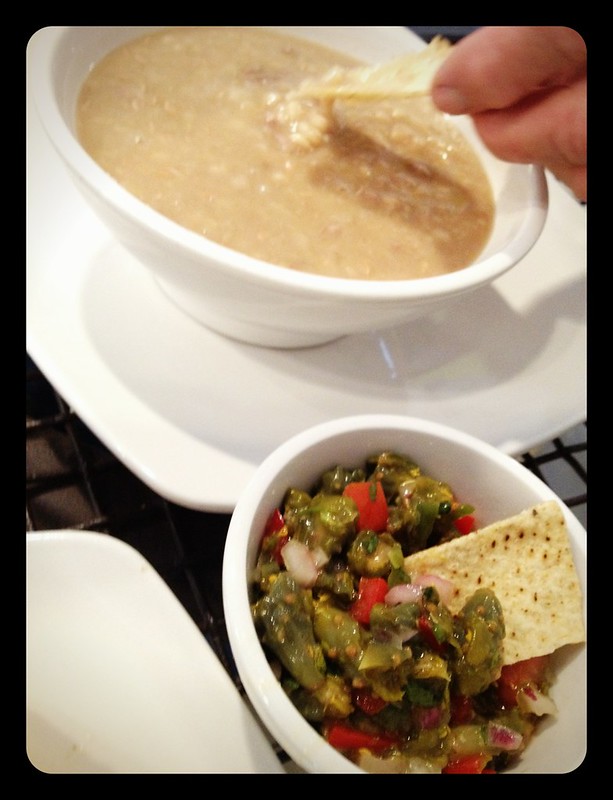As a thunderstorm charged across the desert floor north of us, dust and sheets of rain sailing dramatically in its path, we headed west across the vast Tohono O'odham Nation to visit a little cafe we read about over the weekend.
Tohono O'odham Community Action (TOCAonline.org) has many worthwhile projects across this vast nation (2.8 million acres), but their Desert Rain Cafe and Gallery, in the very nice, rather upscale shopping center on Sells' main street (Indian Route 19, on Google maps), is their most visible.
We pulled up at about 1 pm, and the place was hopping. All the tables on the porch (cooled by misters and shaded by mesquite trees on the west) and inside the small but cheerful cafe were full, and there were several people at the counter ordering. It's hard to miss the bright yellow walls—exactly the color of desert marigolds.
The menu features not only desert foods, but locally farmed on the nation. All the proceeds benefit community projects, and the young people involved in the cafe project and farming are gaining valuable skills in food production and running businesses. From the TOCA website:
TOCA’s Desert Rain Cafe’ opened in April, 2009 as the only restaurant using locally-farmed Tohono O’odham foods, including tepary beans, O’odham squash, and cholla buds. In the first year, the cafe served 90,000 meals. In September, 2010, TOCA was able to publish From I’itoi’s Garden: Tohono O’odham Foodways. The cookbook serves as the basis for Desert Rain Cafe’s menu.
TOCA’s commitment to offering affordable, fresh, native meals in the O’odham community has improved the local food system. The cafe’s success and leadership by young adults has helped TOCA and our community partners bring traditional O’odham foods into the local schools:
- In April, 2010, the first O’odham meals were served in local schools.
- In October, 2011, the Indian Oasis Baboquivari School District made tepary bean quesadillas part of its daily menu for K-12 students.
- TOCA’s Y.O.U.T.H. & Project Oidag help in the school gardens and activities.
We ordered from the lunch menu ("Monsoon") as well as the appetizers ("Drizzle"). I had the prickly pear cactus-and-chile-glazed grilled chicken sandwich with freshly baked roll, which comes with a side of tortilla chips and pico de gallo salsa made with tomatoes, onions, cilantro, and cholla cactus buds. Jonathan had the white tepary bean and short-rib stew with a chile cornbread muffin. We both had lemonade sweetened with agave nectar. Both entrees were delicious and perfectly cooked, with the glaze just spicy enough to be interesting, and the stew very hardy but not greasy; the cholla-bud salsa is also very tasty, though you have to get used to the slightly mucilaginous texture of the buds. The food at the cafe is also very affordable—the stew was $5.95 and the sandwich $8.95. With drinks and an extra side of chips, the total was $25.
The service was not fast, but there were only 2 staff to handle phones, counter sales, and table service, and they did so with quiet efficiency and friendliness, though not effusive; if you're fond of the "Hi guys! My name is Mandy and I'll be your server!" perky waitstaff, head to the university, not an Indian nation.
Despite being happily stuffed, we had to get a couple of giant mesquite cookies to go. Made with flour from mesquite tree beans, these cookies had an almost gingerbread-like flavor and texture, naturally sweet and carob-y from the mesquite, though they are pretty dense and not super moist.
The clientele was eclectic and friendly; from hip young O'odham women in business attire texting madly on iPhones to bad-ass young men (who Jonathan dubbed, politically incorrectly, "Papago punks") with gelled hair, Bowie knives, tattoos and 'tudes, as well as Anglo teachers and social workers, O'dham business people, and "foreign" travelers (two men from Germany). It felt like we were far, far from the USA, which in a way we were.
As we left the cafe to head back to Tucson, we saw a scene unique to Indian nations and developing countries across the globe: livestock casually wandering the streets, in this case half a dozen horses with new foals, the traffic barely slowing down to get around them.
It's great to be reminded you can explore just 50 miles from home and still have wonderful travel experiences.












